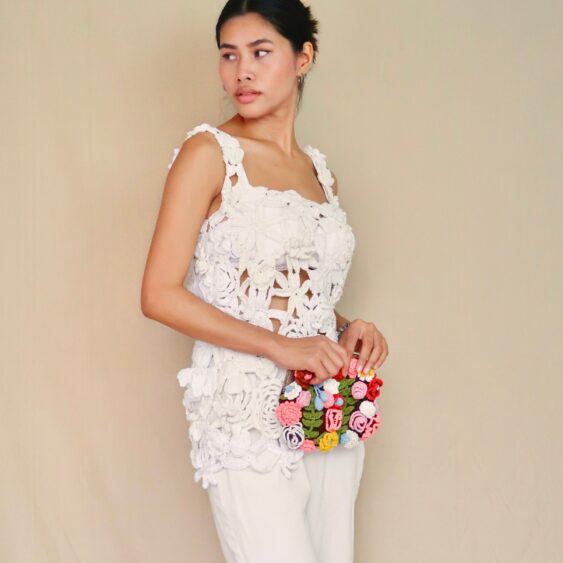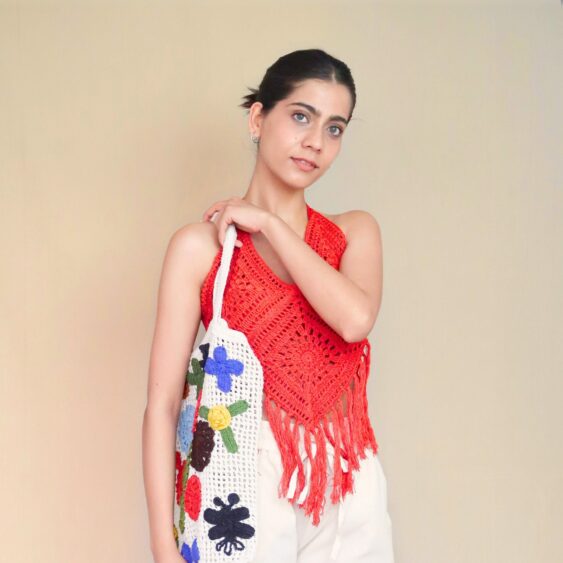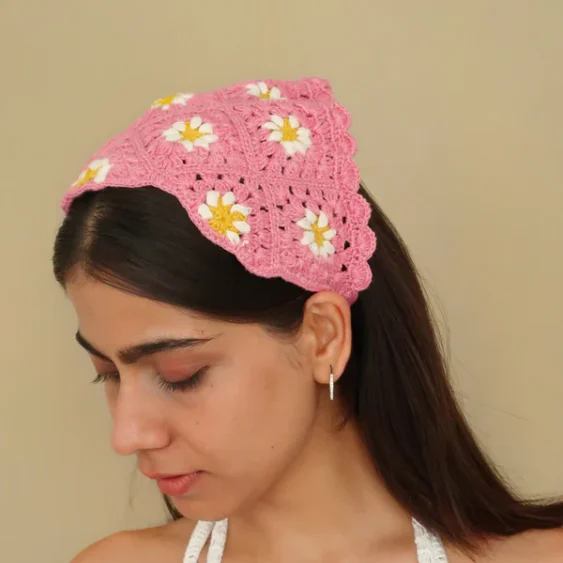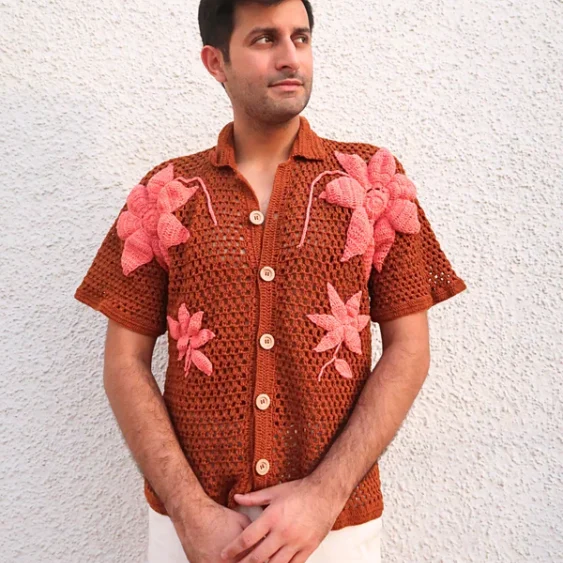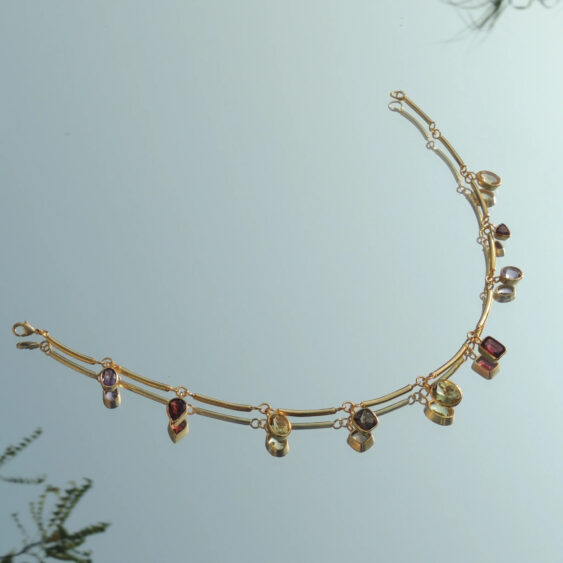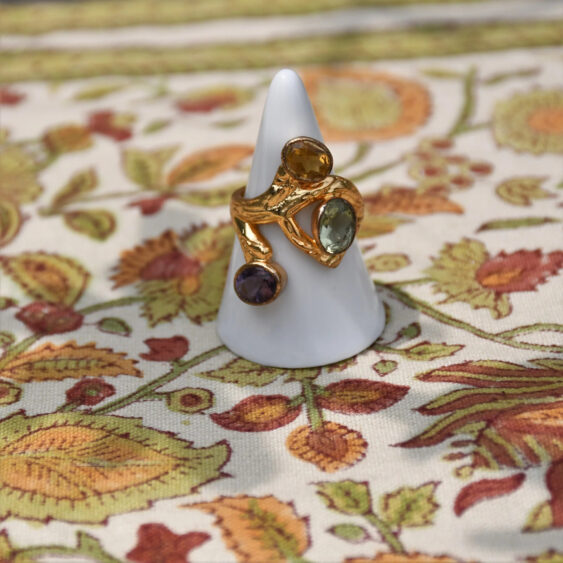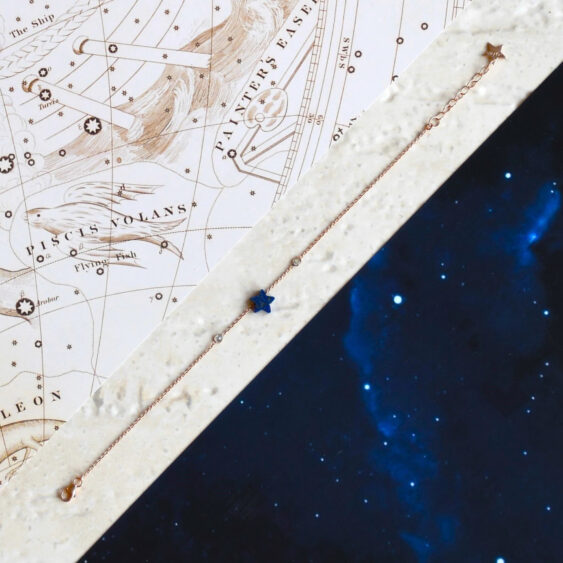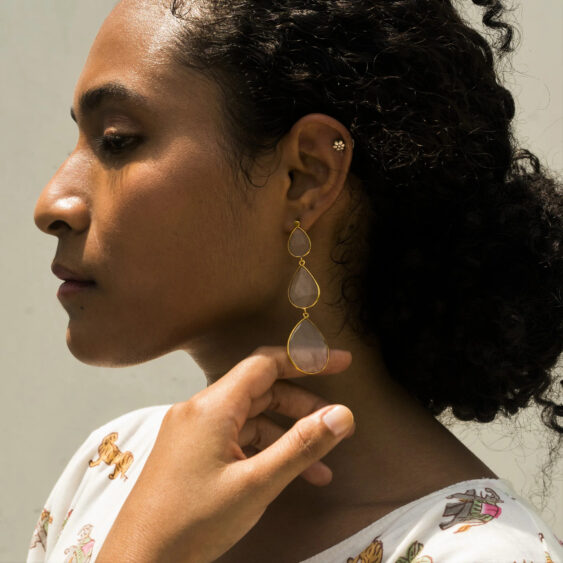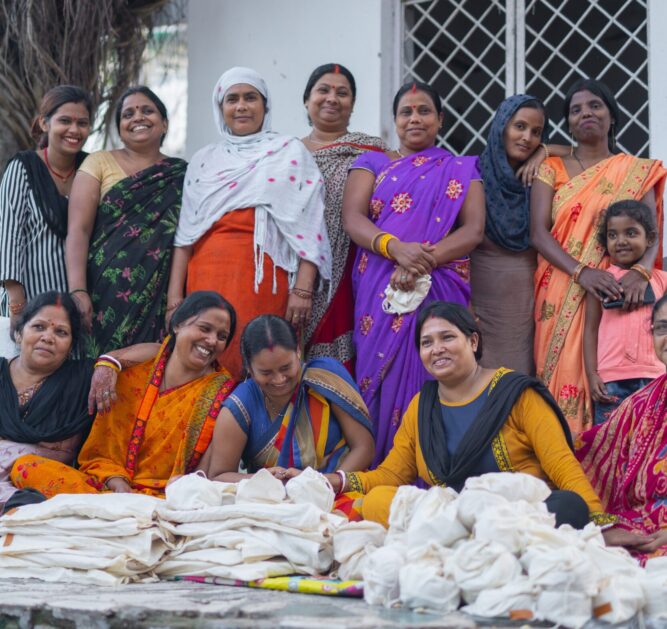
While their crochet clothing and accessories are a delightful addition to any wardrobe, what drives Kalaa is all the more compelling. At its core—now embraced by prominent figures like Sonam Kapoor—Kalaa is powered by women from communities where working out side of homes is often met with resistance. Speaking with co-founder Ananya Ishani Singh who runs Kalaa alongside her mother, Blur The Border discovered how the brand’s ethos is deeply rooted in learning from these women—embracing their compassion, care, and stewardship of sustainability—qualities that infuse every single Kalaa product, transforming them into timeless keepsakes.
Ananya's Picks
Who is the one influencer you wish to see using your products?
Vicky Montaneri

Is there a podcast/book/social media handle that you’ve found helpful for your business?
Podcast: The Good Life Project
Book: Big Magic by Elizabeth Gilbert







If you could collaborate with any Indian or international brand, who would it be?
Chloe







BTB: What inspired you to work with crochet as the main medium for your brand?
ANANYA: My mother who is also the co-founder of Kalaa was working with Indira Kalyan Camp, in an urban slum in Delhi, where women skilled in crochet and macrame were being given income opportunities. One day, she brought home a crocheted blouse made by our master trainer, Rita ji. I fell in love with it and posted it on Instagram around May in 2022, which got a lot of attention- and by August I started thinking about Kala as a social enterprise. At the time, crochet clothing wasn’t common in India, and people didn’t realize they could wear it. So we saw a gap in the market that we wanted to fill.
As we expanded the project, we discovered that many women, especially in Bihar and UP, already knew crochet, as the skill is often passed down through generations, particularly in Muslim communities. In many homes, women make crochet items for bridal trousseaus, like thali covers or TV covers. Around Janmashtami, women make little crochet clothes for Kanhaiya (the idol). Whereas, in villages, we saw crochet cloths being used during wedding ceremonies to cover Matkas and Prashads—we saw its potential in the market. The essence of Kala is to provide women with flexible work-from-home opportunities and crochet felt perfect because it doesn’t require equipment or machinery. Women can sit with their babies on their laps—nursing and crafting at the same time. It’s a craft that blends seamlessly into their daily lives and often doesn’t even seem like 'work,' which can be beneficial in highly patriarchal societies where there might be resistance from husbands or household heads.
BTB: Kala is addressing the critical issue of women's employment through the Kalaa Sakhi initiative and you been able to impact hundreds of women across three different locations. Could you share more about this mission and the impact it has had on these communities?
ANANYA: One crucial aspect of working at the grassroots level is creating systemic change through workshops and training. We offer financial inclusion workshops to help women manage their bank accounts, savings, and inter-loaning. We also hold nutrition workshops to address issues like anaemia and iron deficiency, particularly important for pregnant women. These sessions may go unnoticed on the business side of things, but nurturing communities in this way creates lasting change. The impact compounds across generations, families, and villages, and that’s what we aim to sustain.
Although the impact is different in every community we work with, depending on the cultural and geographic context. We chad gotten a chance to collaborate with large organizations like Netflix and they invited us for the screening of Bhakshak. This exposure helped the women see the broader value of their craft. The direct economic impact has also been significant. One of the first things we noticed was that as soon as these women started earning, 100% of them enrolled their children in private tuition, using their own income to even provide private tutors. Now, their children have much bigger aspirations and aim higher—all while balancing caregiving and family duties. Stories like this fuel our mission to sustain Kala as an enterprise every day. In regions like Nuh, despite being India’s most backward district in Haryana and communally tensed, there is complete coexistence within the craft communities. In Neemrana, Rajasthan, where women are often seen in ‘ghoonghat’, our workshops are a release for them. They relax, chat, work, and sometimes even sing and dance And all of these have been known to bring women together for centuries, right? So, we create a space for that sisterhood. We have opened over 60 bank accounts for the women there—they have learned to read their passbooks and, for the first time, money coming directly into their accounts, separate from their husbands. We have seen men stand up for their wives during quality checks, encouraging us to accept the work. Craft has become a tool to tie communities together, uniting people through the shared creation of beauty and economic opportunity.
BTB: Ananya, you mentioned that your experience working with ASHA workers in Assam inspired your focus on women's empowerment. How has that experience influenced the ethos and operations of Kalaa Sakhi and Kalaa Store?
ANANYA: During this 10-day fieldwork in I was deeply inspired by frontline worker women (Anganwadi and ASHA workers) who as caregivers, would wake up each day, go from one river island to the next, set up camp, and provide care. In any emergency, they were the ones responding –also seen commonly seen in our healthcare system. Women tend to bring feminine qualities of compassion and care which allow them to truly connect with patients at the frontline. However, there are very few women at the leadership table as you move up the hierarchy. After this experience, I had a review meeting with a female IAS officer, the district collector. I was in awe of the way she led the team and infused these qualities of care and compassion in her leadership style and pushed the team to care for each individual patient’s life with dedication and passion. That’s when I knew: my goal in life is to ensure more women are in the workplace, contributing. When I think of Kalaa, it never feels like a charity project to me. Yes, we want to give women financial independence, but I know for a fact that women will always find a way to earn. What the world truly lacks is women in the workforce, bringing these feminine qualities of creativity, compassion, and care into the workplace.
Culturally, this became the ethos of Kalaa. When you visit a village workshop, you’ll notice everything slows down, and women work together in harmony. That harmony became the foundation of why gender is central to our work at Kalaa. It’s also why, both within our organization and externally, we prioritize compassion. Through our Instagram, stories, postcards, and products, we try to send love out into the world.
BTB: What are some non-commercial victories you have achieved that have helped your business?
ANANYA: Conceptually, tying communities together has been the most empowering—to be able to send our products abroad. That there is dignity for women now, from not earning anything or having exposure to products being loved by people and communities across the globe is quite fulfilling. Even when my friends buy Kalaa products and go on holidays it feels like a piece of me is with each of the products. Of course, the non-commercial victories have been about empowering women but at a very abstract level, being able to connect communities across time and space has just been a very beautiful thought to be able to sleep at night with.
My last purchase from a homegrown brand was …
Kama Ayurveda’s Kumumadi Thylum
Beet Tint by Ilana Organics







What is the show/book/song you are currently obsessing over?
Green Eyes by RHYE


In my spare time, you’ll find me…
Yoga or unwinding with with a book or a podcast







Name a few other homegrown small brands you are loving right now.
Olio Stories & Ilana Organics







Your personal favourite the Kalaa Store?
Our Land & Lore Clutch
BTB: Running a mother-daughter business must bring its own perks and challenges. How do you balance your individual perspectives while steering the brand forward?
ANANYA: It’s a double-edged sword but interestingly our views are aligned and if I had to pick anyone in the world and she wasn't my mother I would want her to be my co-founder. Sometimes it can be challenging, yes. But we take time off and have conversations. Since our roles are very different we have been able to bifurcate them based on our fortes. We recently took a personality test where the outcome was the same for both of us and it really validated in terms of our beliefs with Kalaa and why it is expanding. So, I think for anyone who has a co-founder, it's really important to fundamentally connect on the mission.
BTB: How has the industry support been and what more can the industry do to create space for emerging brands like yours?
ANANYA: It has been super receptive. I have actually had a lot of inbound requests from the stylists and people who have found our page very organically. For example, Sonam Kapoor recently wore our clutch bag and Ruturaj Gaikwad wore our shirt for a commercial shoot.
We are like an army of craftswomen who can co-create with so many brands, and they can all have their design footprint. That's one thing from the industry I hope happens in the future. It shouldn't be limited to what one designer is doing. They should see people coming together, mixing their design languages and mixing mediums.
BTB: Sustainability is a significant part of Kalaa’s identity. How do you source materials, and what practices do you employ to ensure that your products remain eco-friendly?
ANANYA: The entire inspiration for the brand comes from Indian women who are the true custodians of sustainable practices, and they are deeply connected to durability and care. We educate consumers on how to care for our products, specifically crochet items. This might seem small, but our labeling and communication are vital because we want every product to last.
We also want to explore something with the techniques of ‘paidaans’ which are basically doormats made up of old sarees woven by hand or with frames and needles. We are also experimenting with natural materials, like banana fiber, raffia, and water hyacinth.
BTB: With over 1,000 female creators contributing to Kalaa, how do you ensure their voices are represented and their craftsmanship is valued on a global scale?
ANANYA: I think what most people see is the brand, but a lot of work behind the scenes involves partnerships and collaborations that help get our products to smaller brands in the US. We do white labeling and are working on several collaborations. So, we are not limiting the scope to just what’s available on the website. Our goal is to sustain women through this as a livelihood. To achieve that, we need to stay current with trends and meet the needs of B2B orders, such as merchandising orders. At the B2B level, we have a barcoding system at the backend that helps manage our decentralized supply chain, with women artisans working from various locations. Each tag and piece of inventory is barcoded with the artisan’s name, along with a timestamp, so when the finished product is ready, we know exactly who made it. We co-create tags with the companies we partner with, adding details to their websites so customers know where the products are sourced. This system helps create transparency. The idea of connecting people happens when there’s a face behind the product. Ideally, the customer should know that this item was made with love by a specific person. We have built this system to link products to the artisans, and we are constantly finding ways to make it more efficient and transparent as we move forward.
FOLLOW KALAA STORE'S INSTAGRAM @thekalaastore

